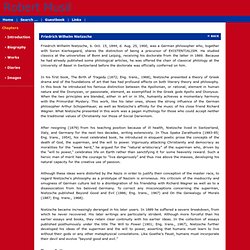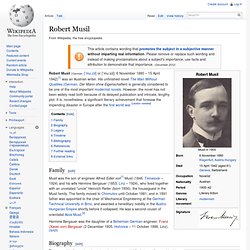

Robert Musil - Friedrich Nietzsche. Friedrich Wilhelm Nietzsche, b.

Oct. 15, 1844, d. Aug. 25, 1900, was a German philosopher who, together with Soren Kierkegaard, shares the distinction of being a precursor of EXISTENTIALISM. He studied classics at the universities of Bonn and Leipzig, receiving his doctorate from the latter in 1869. Because he had already published some philological articles, he was offered the chair of classical philology at the University of Basel in Switzerland before the doctorate was officially conferred on him. In his first book, The Birth of Tragedy (1872; Eng. trans., 1968), Nietzsche presented a theory of Greek drama and of the foundations of art that has had profound effects on both literary theory and philosophy. After resigning (1879) from his teaching position because of ill health, Nietzsche lived in Switzerland, Italy, and Germany for the next two decades, writing extensively. Nietzsche became increasingly deranged in his later years.
Thomas E. The Man Without Qualities. The Man Without Qualities (1930–43; German: Der Mann ohne Eigenschaften) is an unfinished novel in three books by the Austrian writer Robert Musil. The novel is a "story of ideas", which takes place in the time of the Austro-Hungarian monarchy's last days, and the plot often veers into allegorical dissections of a wide range of human themes and feelings.
It has a particular concern with the values of truth and opinion and how society organises ideas, though the book is over a thousand pages long and no one theme dominates. Plot summary[edit] The first book, entitled "A Sort of Introduction", is an introduction of the protagonist, a 32-year old mathematician named Ulrich who is in search of a sense of life and reality but fails to find it. His ambivalence towards morals and indifference to life has brought him to the state of being "a man without qualities," depending on the outer world to form his character.
A couple of people take part in the organization team or catch the eye of Ulrich. Robert Musil. Robert Musil (German: [ˈmuːzɪl] or [ˈmuːsɪl]; 6 November 1880 – 15 April 1942)[1] was an Austrian writer.

His unfinished novel The Man Without Qualities (German: Der Mann ohne Eigenschaften) is generally considered to be one of the most important modernist novels. However, the novel has not been widely read both because of its delayed publication and intricate, lengthy plot. It is, nonetheless, a significant literary achievement that foresaw the impending disaster in Europe after the first world war. [citation needed] Family[edit] Musil was the son of engineer Alfred Edler von[1] Musil (1846, Temesvár – 1924) and his wife Hermine Bergauer (1853, Linz – 1924), who lived together with an unrelated "uncle" Heinrich Reiter (born 1856), the houseguest in the Musil family.
Hermine Bergauer was the daughter of a Bohemian German engineer, Franz (Xaver von) Bergauer (3 December 1805, Hořovice – 11 October 1886, Linz).[3][4][5] Biography[edit] Commemorative plaque in Brno. Sagprosaanmeldelse: Nietzsche som etiker af Mette Blok. Mette Blok har skrevet en højest vedkommende bog om Nietzsches etik. Forfatteren går med held uden om faldgrupperne i den kendte receptionshistorie. Dermed fremstår et værk med en udogmatisk og vedkommende friskhed, hvor Blok med stor sproglig kraft tillader sig at fortolke og sætte de værdier i Nietzsches forfatterskab, der ikke sætter sig selv.
Men med den ulempe, at værket sine steder mangler en kritisk afstand til Nietzsche og stedvis ligner et forsvarsskrift for en angriber. Til gengæld får læseren en dybt vedkommende udlægning af sider hos Nietzsche, der er og har været for lette at se bort fra eller stort på: Det er en aktualiseringen af en tænker, der kalder på relanceringen af etikken, om end den savner historien om et menneske, der ikke var uskyldig i dæmoniseringen af ham selv. Det hele menneske – og den halve Nietzsche Franz Kafka nævner i sin dagbog ”det grufulde i det rent systematiske”.
Det handler for ham om at få troværdigheden, ægtheden, smerten med. Humanisme? Vis - Roskilde Universitet.